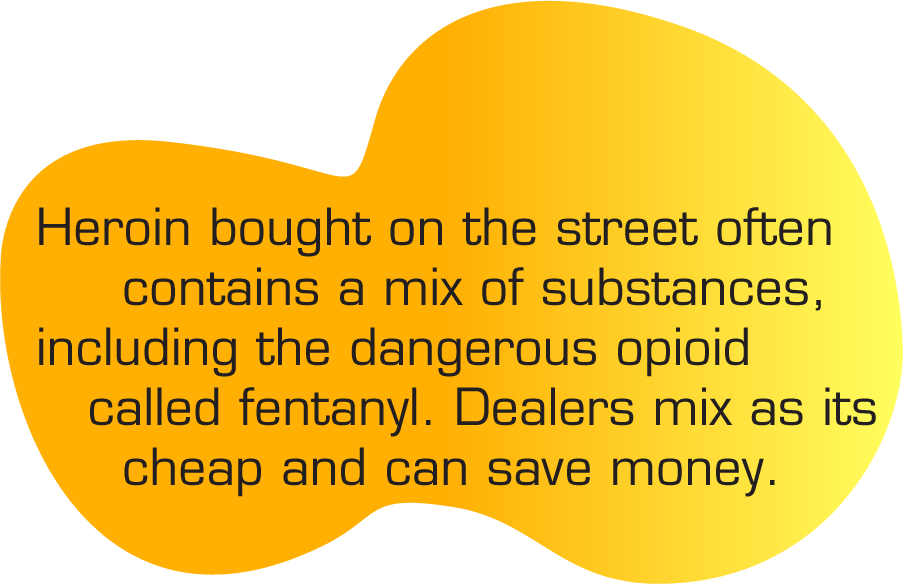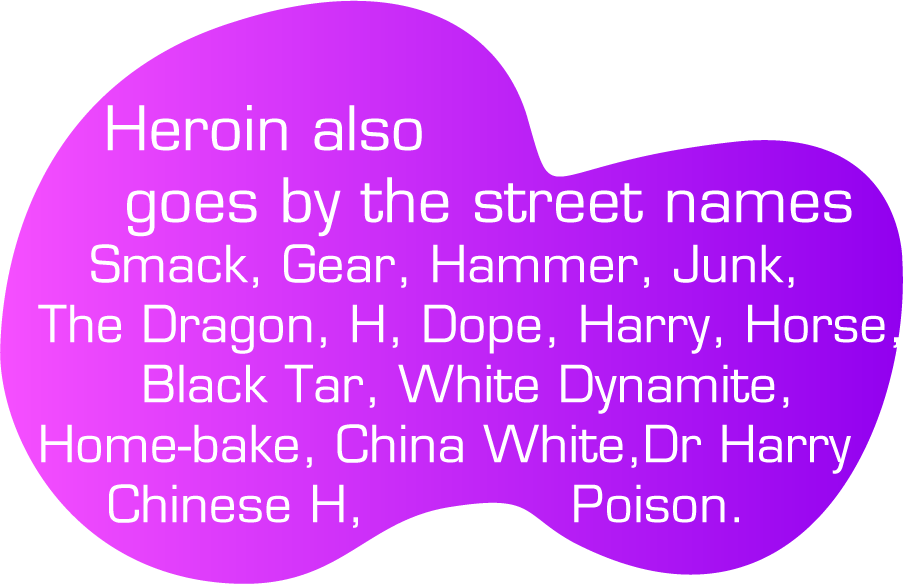Drugs Explained

Heroin
Heroin is part of a group of drugs known as opioids.
Opioids interact with opioid receptors in the brain and elicit a range of responses within the body; from feelings of pain relief, to relaxation, pleasure and contentment.
Heroin comes in different forms, including:
- fine white powder
- coarse off-white granules
- tiny pieces of light brown ‘rock’.
It is normally sold in ‘caps’ (a small amount, usually enough for one injection) or grams. It is usually packaged in ‘foils’ (aluminium foil packaging) or small, coloured balloons.
Heroin is mixed with water and injected with a needle. It can also be sniffed, smoked, or snorted.
People who use heroin sometimes combine it with other drugs, such as alcohol or cocaine (a “speedball”), which can be very dangerous and raise the risk of overdose.

What happens to your brain when you use heroin?
When heroin enters the brain, it attaches to molecules on cells known as opioid receptors. These receptors are located in many areas of the brain and body, especially areas involved in the perception of pain and pleasure, as well as a part of the brain that regulates breathing.
Short-term effects of heroin include a rush of good feelings and clouded thinking. These effects can last for a few hours, and during this time people feel drowsy, and their heart rate and breathing slow down. When the drug wears off, people experience a depressed mood and often crave the drug to regain the good feelings.
Regular heroin use changes the functioning of the brain. Using heroin repeatedly can result in:
TOLERANCE
more of the drug is needed to achieve the same “high”
DEPENDENCE
the need to continue use of the drug to avoid withdrawal symptoms
ADDICTION
a devastating brain disease where, without proper treatment, people have trouble stopping using drugs even when they really want to and even after it causes terrible consequences to their health and other parts of their lives. Because of changes to how the brain functions after repeated drug use, people that are addicted crave the drug just to feel “normal.”
What happens to your body when you use heroin?
Short Term
Opioid receptors are located in the brain, the brain stem, down the spinal cord, and in the lungs and intestines. Thus, using heroin can result in a wide variety of physical problems related to breathing and other basic life functions, some of which may be very serious.
Here are some ways heroin affects the body:
- dry mouth
- warm flushing skin
- heavy feeling arms and legs
- feeling sick to the stomach and throwing up
- severe itching
- clouded thinking
- a temporary feeling of intense happiness
- going "on the nod," switching back and forth between being conscious and semi-conscious
- increased risk of HIV and hepatitis (a liver disease) through shared needles and poor judgment while “high” leading to other risky behaviours. (read more about the link between viral infections and drug use)
When mixed with alcohol, short-term effects can include:
- coma—a deep state of unconsciousness
- dangerously slowed (or even stopped) breathing that can lead to overdose death

Long Term
- problems sleeping
- damage to the tissues inside the nose for people who sniff or snort it
- painful area of tissue filled with puss (an abscess)
- infection of the heart
- constipation and stomach cramping
- liver and kidney disease
- lung problems
- mental health problems, such as depression
- sexual problems for men
- changes in menstrual cycles for women
In addition to the effects of the drug itself, heroin bought on the street often contains a mix of substances, including the dangerous opioid called fentanyl.
Drug dealers add fentanyl because it is cheap, and they can save money.
Some of these substances can be toxic and can clog the blood vessels leading to the lungs, liver, kidney, or brain.
This can cause permanent damage to those organs.
Also, sharing drug injection equipment or engaging in risky behaviours can increase the risk of being exposed to diseases such as HIV and hepatitis.



